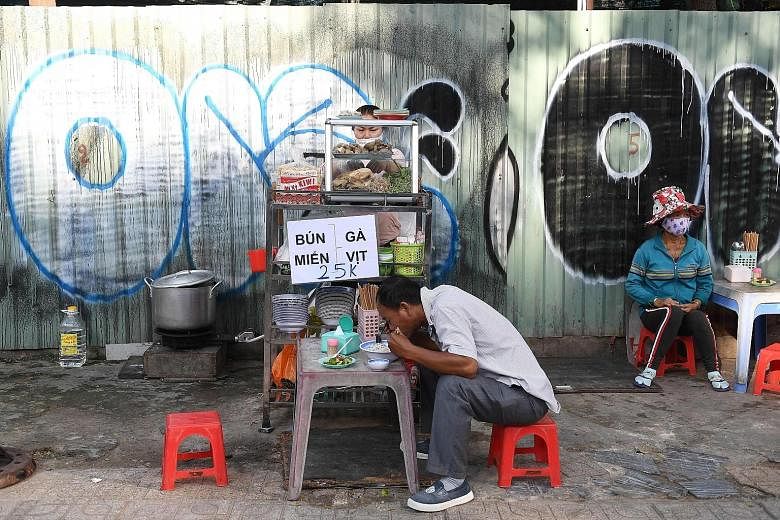HANOI • Vietnam's fragrant noodle soups and fresh spring rolls have won fans across the globe, but mounting food safety scandals on the country's streets are sparking a rising tide of anxiety among millennials about what they eat.
Accountant Tran Huong Lan, 32, spent two nights in hospital the last time she ate "bun cha", Hanoi's signature pork noodles enjoyed by former US president Barack Obama on a visit four years ago.
"About two hours after lunch I started feeling unwell. I went home and I started vomiting," she said. Rushed to hospital, doctors told her there was only one explanation: food poisoning.
She did not eat out again for a month after her scare, and frequent high-profile food safety scandals have fed the fears of others.
In July, 14 people were taken to hospital in severe condition after being poisoned by vegan pate. Many experienced droopy eyelids and paralysed respiratory muscles.
There is also growing unease about high pesticide use in growing the vegetables and herbs found in typical street food dishes such as fresh shrimp rolls.
Some 70 per cent of people aged 16 to 30 said food safety was their top concern - ranking the same as job security - when polled by the British Council in Vietnam.
Mr Truong Quoc Tung, director of the Vietnam Plant Protection Association, said the problem was approaching "crisis proportions".
"Banned pesticides are being used, the environment is polluted and agricultural products are being sent back after being shipped abroad," he told state media.
Problems with food safety cost Vietnam around US$740 million (S$997 million) a year in productivity, the World Bank says.
But across the country, Vietnamese are doing what they can to ensure they eat safely.
Mr Ngo Xuan Quyet, 26, used to sell pesticides for a living before switching to safe farming.
With the help of Rikolto, a non-governmental organisation that promotes safe food policies, he is trying to ensure that his lettuce, spring onions and herbs - grown with a strictly controlled dose of pesticides - make it into as many bowls of bun cha as possible.
"When I worked (at the pesticide firm), I really got to know about the chemical substances in them," said the farmer, who studied agriculture at university. "I learnt about the awful impact (of overuse)... and I started to want to grow safe vegetables."
Heavy metals found in soil or water used for agriculture in Vietnam may be a significant contributor to the incidence of some forms of cancer, the World Bank says, while heavy pesticide use may also have long-term impacts.
Priced 10 per cent to 20 per cent higher than standard vegetables, Mr Ngo's produce is on sale at two major supermarkets in Hanoi.
A growing proportion of the county's urban consumers are willing to pay the extra, according to the World Bank, while some are largely turning their backs on traditional street food stalls.
Many others are also investing in their own personal food supply.
Madam Le Thi Thanh Thuy, 69, grows lettuce, morning glory and more than a dozen other vegetables on her roof in western Hanoi.
"Sometimes the vegetables we buy at the market may look nice and fresh but we don't know their origin," she said.
For Mr Ngo, the dream is to guarantee quality produce everywhere - from the local wet market to the cheap-as-chips food stall on the street corner.
AGENCE FRANCE-PRESSE

